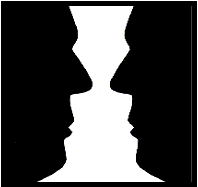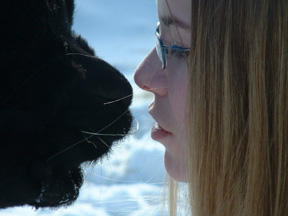10/18/2005
Inside and outside the ethical perspective
 So according to Rudi Visker Levinas tries to put mouths full of rice so that the other can't speak to him anymore, and the other is supposed to be an abstract other without a specific identity and relevant cultural categories that he belongs to. So far I didn't read any criticism towards Levinas' philosophy that I agreed with. But after all I have read, I would like to make some remarks myself, about the shock of the face to face meeting (illustrated with some random google pictures called "face to face").
So according to Rudi Visker Levinas tries to put mouths full of rice so that the other can't speak to him anymore, and the other is supposed to be an abstract other without a specific identity and relevant cultural categories that he belongs to. So far I didn't read any criticism towards Levinas' philosophy that I agreed with. But after all I have read, I would like to make some remarks myself, about the shock of the face to face meeting (illustrated with some random google pictures called "face to face"). For Levinas the reality is fundamentally ethical. There is nothing that matters matters more in life than the ethical relation with another person. The relation is already ethical before I consciously thought about it and before I made a rational decision of how I would react. When Levinas describes the meeting with another person, this is not an abstract situation, this is what happens all the time around us. For Levinas it's a big shock to meet the other, he feels ashamed, he feels a strong urge to respond to the (unconscious) appeal that the other makes. The first person becomes a kind of hostage of the other.
For Levinas the reality is fundamentally ethical. There is nothing that matters matters more in life than the ethical relation with another person. The relation is already ethical before I consciously thought about it and before I made a rational decision of how I would react. When Levinas describes the meeting with another person, this is not an abstract situation, this is what happens all the time around us. For Levinas it's a big shock to meet the other, he feels ashamed, he feels a strong urge to respond to the (unconscious) appeal that the other makes. The first person becomes a kind of hostage of the other. Levinas doesn't really mean this in a symbolic way, he means it quite literally. But I don't think that the way Levinas sees this is very common. If people would be ashamed and shocked every time they saw a face of the other in front of them, they would be shocked many times during the day. I can be shocked sometimes, when I am lost in my own thoughts and a stranger speaks to me at once, for instance, or when in an important meeting somebody suddenly asks me a difficult question. But usually it's not a big confrontation to meet another person, it happens naturally usually.
Levinas doesn't really mean this in a symbolic way, he means it quite literally. But I don't think that the way Levinas sees this is very common. If people would be ashamed and shocked every time they saw a face of the other in front of them, they would be shocked many times during the day. I can be shocked sometimes, when I am lost in my own thoughts and a stranger speaks to me at once, for instance, or when in an important meeting somebody suddenly asks me a difficult question. But usually it's not a big confrontation to meet another person, it happens naturally usually.  Levinas looks at the world through ethical glasses, everything he sees, he interprets as good or bad. When he chooses for an evil action this will weigh heavily on his consciousness. When he would decide not to respond to the appeal of the other, to pretend not to have noticed or heard the other, he would realise all the time what he is doing, it would be very hard for him to objectify the other. Levinas describes the meeting with the other as if every human being wears the same ethical glasses as he does. This is why he can be optimistic about the human nature, and why he says that peace is the natural and primary state of the world, not war, and that the relation with the other is ethical by definition, the other always does an appeal to me, it doesn't matter how I choose to react to that. Every human being is in principle accessible for the appeal that the other makes, so when he chooses not to respond that's his own decision.
Levinas looks at the world through ethical glasses, everything he sees, he interprets as good or bad. When he chooses for an evil action this will weigh heavily on his consciousness. When he would decide not to respond to the appeal of the other, to pretend not to have noticed or heard the other, he would realise all the time what he is doing, it would be very hard for him to objectify the other. Levinas describes the meeting with the other as if every human being wears the same ethical glasses as he does. This is why he can be optimistic about the human nature, and why he says that peace is the natural and primary state of the world, not war, and that the relation with the other is ethical by definition, the other always does an appeal to me, it doesn't matter how I choose to react to that. Every human being is in principle accessible for the appeal that the other makes, so when he chooses not to respond that's his own decision. But what if most people look at the world and at the other from a non-ethical perspective? What if they are prejudiced and if they discriminate they other without realising it? What if their intentions are good or neutral but that they just don't realise that the other is doing an appeal to them, that he asks for help or for a respectful response?
But what if most people look at the world and at the other from a non-ethical perspective? What if they are prejudiced and if they discriminate they other without realising it? What if their intentions are good or neutral but that they just don't realise that the other is doing an appeal to them, that he asks for help or for a respectful response? If the first person doesn't feel ashamed when he is confronted with the naked face of the other, if he doesn't feel a desire to be in real contact with the other, to welcome him, if he remains indifferent to the other and just walks on, then how can levinas expect that person to react in an ethical way? And if that person really doesn't know what he is doing, if he doesn't decide deliberately to ignore the other, but if he just isn't conscious about what is happening, how can you judge his behaviour then? If he is completely ignorant you can't be angry with him that he objectivies the other, you can't blame him for that, you can't call his behaviour evil.
 Or should you expect from everybody that they are able to understand themselves that the other makes an appeal to them? I think you can't expect that, when nobody has ever shown / explained that to an ignorant person.
Or should you expect from everybody that they are able to understand themselves that the other makes an appeal to them? I think you can't expect that, when nobody has ever shown / explained that to an ignorant person. I think that this is one of the most difficult points in Levinas ethical philosophy: what happens to that philosophy when you step outside of Levinas' ethical perspective? Levinas' philosophy is not completely utopian in my opinion, since he is not the only person in the world with ethical glasses. But how does his theory apply to people with not so clear ethical glasses?
 I see this a lot at Orkut, that people hurt and objectify / totalise each other while their intentions aren't bad, while they just don't realise what they are doing. It takes me a lot of efforts to explain to them why I think that behaviour which is based on prejudices / xenofobia / hate etc. is bad. You can only expect responsible behaviour from people when they first understand why it is wrong what they are doing.
I see this a lot at Orkut, that people hurt and objectify / totalise each other while their intentions aren't bad, while they just don't realise what they are doing. It takes me a lot of efforts to explain to them why I think that behaviour which is based on prejudices / xenofobia / hate etc. is bad. You can only expect responsible behaviour from people when they first understand why it is wrong what they are doing. And many people are fundamentally indifferent, they don't really try their best to be good ethical persons who don't hurt others unnecessary, many people don't really care about it, they are so much locked up in their selfish and egocentric little world that the appeal of the other doesn't reach them. This makes the work of justice, the struggle to stimulate ethical behaviour much more complicated, but it is a reality that cannot be denied.